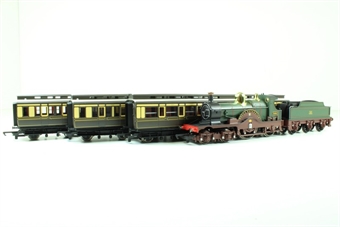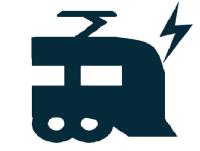Hornby R2706LN GWR "The Flying Dutchman" train pack Royal Sovereign + 3 coaches. Limited edition of 2000 - Like new - Pre-owned
This item was sold "brand new" by us and you can see it at www.hattons.co.uk/stockdetail.aspx?sid=22922
The name Flying Dutchman has a convoluted history. In common with many steam and diesel engines such as the LNER A1's and BR class 55 Deltics, the Flying Dutchman was named after a famous racehorse, which had won both the Derby and St. Leger in 1849. The racehorse was in turn named after the famous Dutch Admiral Tromp. In 1845 the 09:30 morning express train between London Paddington and Exeter was taking 5 hours with stops at Didcot, Bath, Bristol and Taunton, this being reduced to 4½ hours during that year. In 1848 the train, now the 09:50 from London Paddington, covered the 53.1 miles to Didcot in 55 minutes, setting a world record start-to-stop average of 57.9mph. The return train was the 11:45 from Exeter. In 1849, the Train took on the name "Flying Dutchman", and added a stop at Chippenham without extending the overall journey time. The up train time was changed to 12:30 which gave an arrival at Paddington of 17:00. In the 1850's performance deteriorated, but the introduction of a service from London Waterloo to Exeter in 4¾ hours by the LSWR in 1862 resulted in the down Flying Dutchman being retimed to leave Paddington at 11:45 with the 1840's journey time of 4½ hours being restored. This was, however, a brief interlude and soon the time to Exeter has stretched to 5 hours and 5 minutes. At this time the train left Paddington with 7 coaches. Two were detached as Swindon; one for Weymouth and the other for Cheltenham, and after detaching 2 more at Newton Abbot for Torquay the remaining three coaches worked through to Plymouth. By 1867 things had got so bad for the GWR that the Flying Dutchman ceased running, being cancelled in October of that year.
This product belongs to the following era(s):
Era 3 The Big Four - LMS GWR LNER & SR














